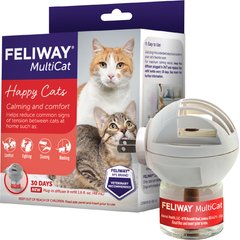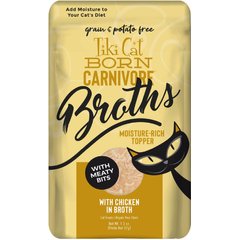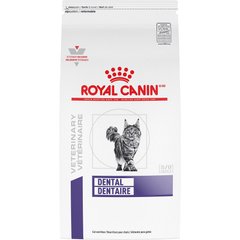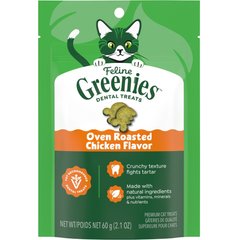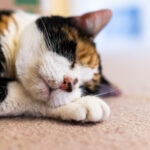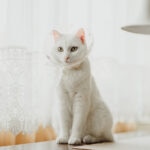Why Is My Cat Losing Weight? Common Causes and Solutions
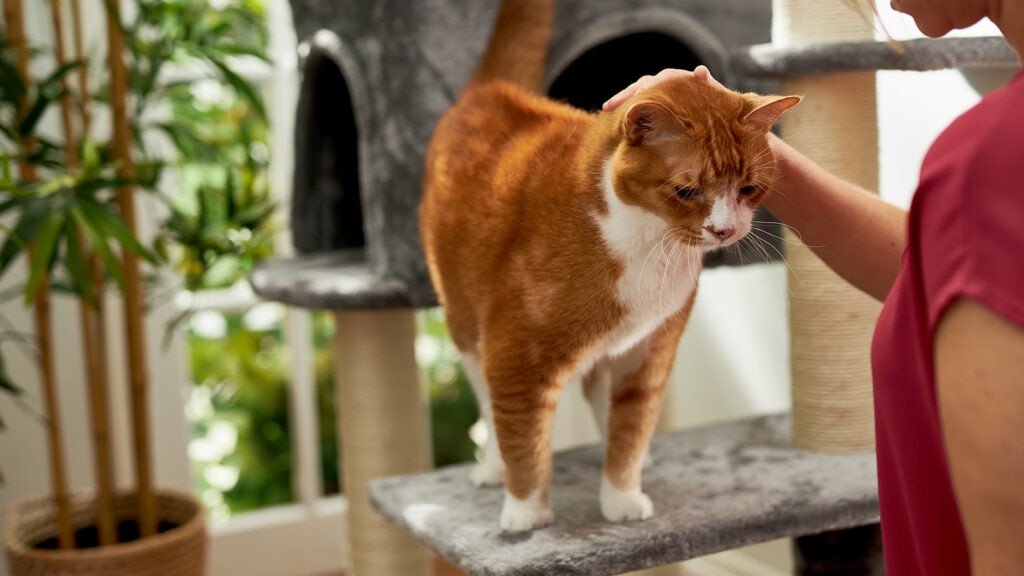
Photo by Chewy
One day, you take a closer look at your cat and think, “Hmm, they’re looking a little thin.” You run your hands through their fluffy fur, and they feel leaner than usual. That’s when the concern kicks in: Why is my cat losing weight?
If your cat is losing weight unintentionally, a health issue may be the cause.
We spoke with two veterinarians to find out why cats lose weight, when to worry, and how to help your furry family member stay healthy.
Why Is My Cat Losing Weight?
Unintentional weight loss in cats can be caused by anything from minor lifestyle changes to serious health issues.
If your cat is otherwise acting normal, a slight weight fluctuation is typically nothing to worry about.
Contact your vet if your cat’s weight loss:
- Occurs suddenly or dramatically
- Continues over time
- Comes with changes in eating habits, behavior, or health
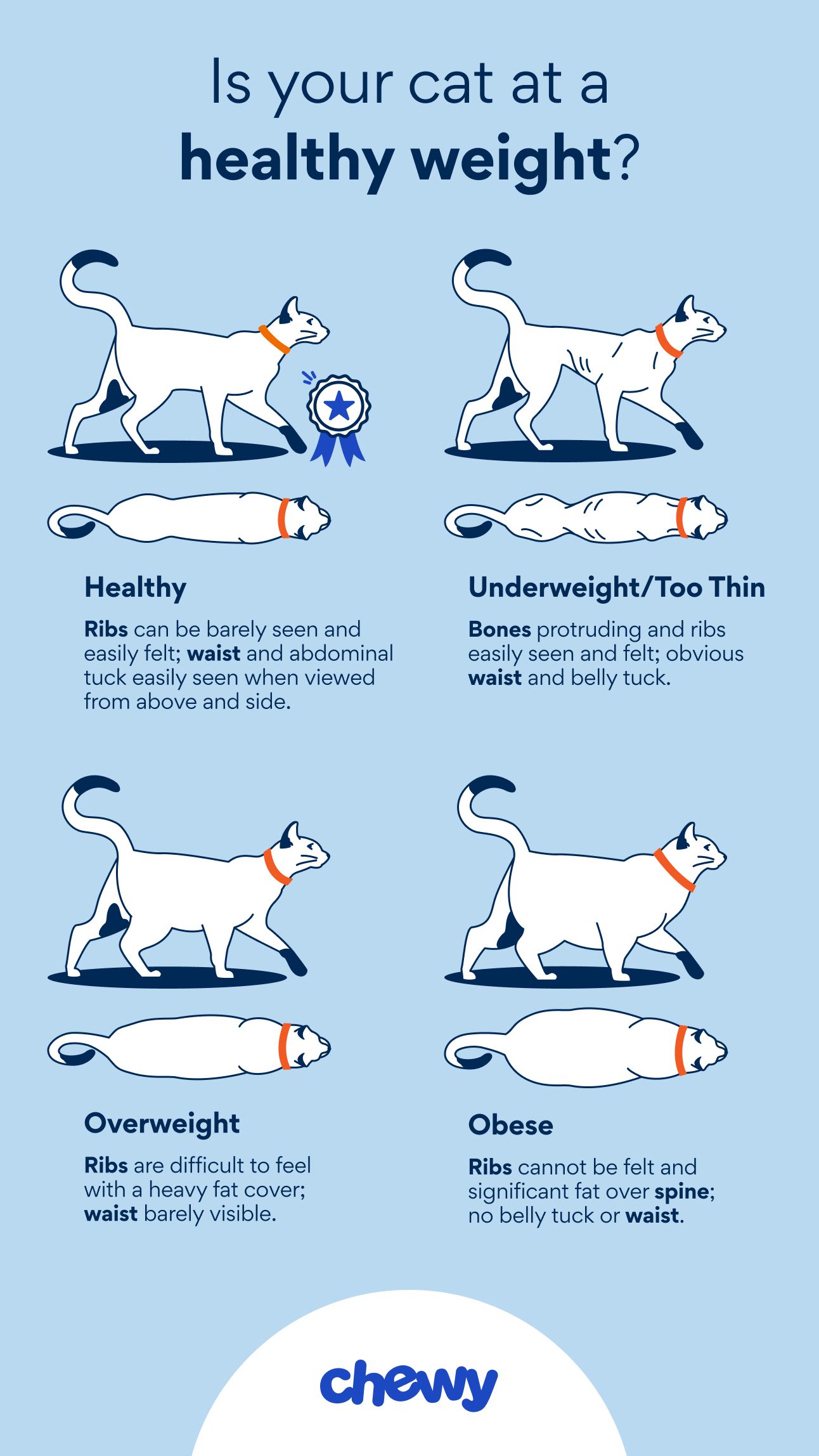
Photo by Chewy
So, what could be behind your cat’s weight loss? Here are the most common reasons, broken down into medical, dietary, and behavioral causes.
Medical Reasons for Weight Loss in Cats
Many health conditions can lead to weight loss, even if your cat is eating normally.
Some of the most common medical causes include:
- Hyperthyroidism: This is a common condition in older cats where the thyroid produces too many hormones, increasing metabolism, says Dean Vicksman, DVM, president of EveryCat Health Foundation in Wyckoff, New Jersey. “These cats tend to lose weight despite having ravenous appetites,” he says.
- Diabetes: This condition affects how the body processes sugar. “You might notice your cat drinking and urinating more than usual while still losing weight,” Dr. Vicksman says.
- Kidney disease: “When the kidneys start to fail, cats often lose weight, drink more water, and may not seem as interested in food,” Dr. Vicksman explains.
- Gastrointestinal disorders: Conditions like inflammatory bowel disease (IBD) or intestinal parasites, such as tapeworms, can interfere with nutrient absorption, leading to weight loss.
- Feline viral disease: Feline infectious peritonitis (FIP), feline leukemia virus (FeLV), and feline immunodeficiency virus (FIV) can all cause weight loss.
- Cancer: Some cancers, particularly gastrointestinal or lymphoma-related types, can cause weight loss in cats.
- Dental disease: Painful teeth or gum infections can make eating difficult, leading to gradual weight loss.
- Upper respiratory infections: Carol Osborne, DVM, founder of Chagrin Falls Veterinary Center & Pet Clinic in Chagrin Falls, Ohio, explains that cats with upper respiratory infections often get a stuffy nose, which can block their sense of smell. Because cats rely on smell to get excited about food, this can make them lose interest in eating and experience weight loss.
Dietary Reasons for Weight Loss in Cats
Sometimes, the reason behind weight loss is directly related to their diet. Common dietary factors include:
- Poor-quality food: Low-quality cat food may lack essential nutrients, leading to gradual weight loss.
- Food intolerances or allergies: Some cats develop sensitivities or allergies to certain ingredients, leading to digestive upset and weight loss.
- A new diet: Switching food too quickly can cause your cat to refuse it, leading to weight loss. Plus, if the new food is lower in calories than their previous diet, they may need larger portions.
- Feeding competition: In multi-cat households, a more dominant cat may prevent a shy cat from accessing food. If you have a dog, they might also sneak some of the cat’s food.
- Difficulty accessing food: Cats with mobility issues, vision problems, or joint pain may have trouble reaching their food bowl or eating comfortably, which can lead to reduced food intake.
- Increased nutrition needs due to aging: As cats age, their bodies become less efficient at absorbing nutrients, meaning they may need more food to maintain a healthy weight. If their diet doesn’t meet their needs, gradual weight loss can occur.
Behavioral Reasons for Weight Loss in Cats
Any increased exercise will lead to more calories burned, which can lead to weight loss.
Additionally, anything that causes your cat to feel stressed, anxious, or depressed can lead to a reduced appetite and weight loss.
Some common triggers include:
- Moving to a new home
- A new pet or person joining the household
- Loud, persistent noises (construction; music; household appliances, like washers and dryers or the vacuum)
- Changes in their environment, like rearranged furniture
- Losing a beloved human or animal companion
- Feeling threatened by another cat, whether inside or outside the home
How Do I Help a Cat Losing Weight?
Some weight loss in cats is normal, but certain cases require veterinary attention.
If your cat looks a bit leaner but is still eating, playing, and acting like their usual self, it’s usually OK to just keep an eye on things.
That said, some signs shouldn’t be ignored. Dr. Vicksman recommends calling your vet if your cat is experiencing any of the following:
- Sudden or rapid weight loss
- Ongoing, unexplained weight loss
- Refusal to eat for more than 24 hours
- Persistent vomiting or diarrhea
- Increased thirst and urination
- Lethargy
- Dull, greasy, or unkempt fur
- Excessive drooling or difficulty chewing
If you’re unsure whether your cat’s weight loss is a concern, it’s always best to check with your vet.
How Do Vets Treat Weight Loss in Cats?
When you take your cat to the vet, Dr. Vicksman says they’ll typically start with blood work and a urinalysis to check for conditions like thyroid issues, diabetes, and kidney disease.
If needed, he says your vet may recommend X-rays, an ultrasound, or specialized tests to look for tumors or other internal problems.
Treatment for weight loss in cats depends on the underlying cause. Here are some common treatment approaches:
- Medication: Conditions like hyperthyroidism, diabetes, and kidney disease typically require ongoing medication. Dr. Osborne notes that cats experiencing appetite loss due to an upper respiratory infection may temporarily require an appetite stimulant, such as Mirataz.
- Diet adjustment: A vet may suggest a different diet, such as a high-calorie, therapeutic, or hypoallergenic diet. Any food changes should be introduced gradually to encourage acceptance.
- Cancer treatment: Treatment may include surgery, chemotherapy, or palliative care.
- Professional dental cleaning: If dental disease is causing weight loss, a vet may recommend a dental cleaning, tooth extractions, or antibiotics.
- Behavioral and environmental adjustments: A vet may suggest ways to reduce stress, boost appetite, prevent food competition, and make eating easier.
How Do I Prevent Unintentional Weight Loss in My Cat?
Preventing unintentional weight loss in your cat starts with proactive care. Here are some key ways to help keep your cat at a healthy weight.
Feed a High-Quality, Balanced Diet
Your cat’s food should have the right balance of protein, healthy fats, and essential vitamins. Check the label for an AAFCO (Association of American Feed Control Officials) statement, which means the food is complete and balanced for their life stage.
Monitor Your Cat’s Weight at Home
Significant or sudden weight loss in cats should always be brought to a vet’s attention.
Keep an eye on your cat’s weight by using a pet scale, like the Redmon Precision Digital Small Pet Scale, or stepping on a household scale while holding them, then subtracting your weight.
You can also do a quick body check by running your hands along their ribs and spine. If they start feeling more bony than usual, schedule a vet visit.
Recommended Product
Minimize Stress and Anxiety
Reduce stress by providing a stable routine and a quiet space for eating.
A pheromone diffuser, like Feliway, can also help create a calm environment.
Recommended Product
Prevent Food Competition
If you suspect food competition, try feeding cats separately or using a microchip-activated feeder, like the SureFeed Microchip Feeder, to ensure each cat gets their fair share.
If a sneaky dog is the culprit, try placing your cat’s food bowl on a higher surface where the dog can’t reach.
Recommended Product
Make Mealtime Appealing
Get your cat interested in mealtime by warming up wet food, trying different textures of food, or adding a tasty food topper, like Tiki Cat Born Carnivore Broths.
If your cat is older or has trouble bending down due to health issues, elevated bowls can make eating more comfortable.
Recommended Products
Address Dental Health
Regularly check your cat’s mouth for signs of dental problems, such as bad breath, difficulty chewing, or tartar buildup.
To help keep your cat’s chompers in good shape, regularly brush their teeth and ask your vet about a prescription dental cat food, like Royal Canin Veterinary Diet Adult Dental Dry Cat Food.
Dental treats, such as Greenies, can also help keep their teeth clean.
Recommended Products
Keep Your Cat’s Vaccinations Up to Date
Keeping your cat’s vaccinations up to date is one of the best ways to protect them from illnesses, including upper respiratory infections, Dr. Osborne says.
Most cats who see the vet regularly get the FVRCP vaccine, which helps protect them from common respiratory viruses.
Schedule Regular Vet Visits
Regular vet checkups are key to catching health issues early.
For adult cats, an annual vet visit is ideal; senior cats typically benefit from checkups every six months.
However, if you notice changes in your cat’s appetite, energy levels, or litter box habits, don’t wait for the next routine visit—schedule an appointment right away.
FAQs About Weight Loss in Cats
Q: Why is my cat losing weight but still eating?
A: If your cat is eating normally but still losing weight, an underlying health issue, such as hyperthyroidism, diabetes, kidney disease, intestinal parasites, or gastrointestinal problems, could be the cause. A vet visit is recommended to determine the cause.
Q: Why is my older cat losing weight?
A: Senior cats may lose weight due to age-related muscle loss, dental issues, or chronic diseases, like kidney disease or hyperthyroidism. Regular vet checkups can help detect and manage these issues.
Q: Can stress cause weight loss in cats?
A: Yes, stress can lead to weight loss. Reducing stressors, providing a quiet feeding area, and using pheromone diffusers, like Feliway, can help.
Q: Should I change my cat’s diet if they are losing weight?
A: Before switching your cat’s food, schedule an appointment with your vet. They can help determine the cause of the weight loss and recommend specific dietary changes or other treatments based on the underlying issue.
Attributions
This content was medically reviewed by Hannah Hart, DVM, Chewy veterinarian.

